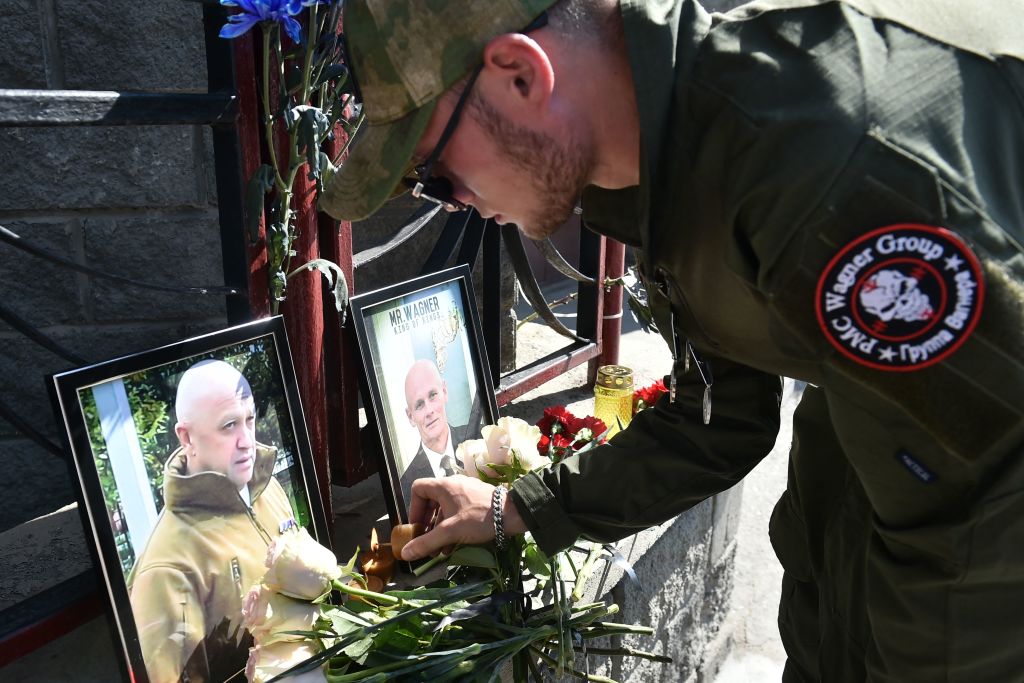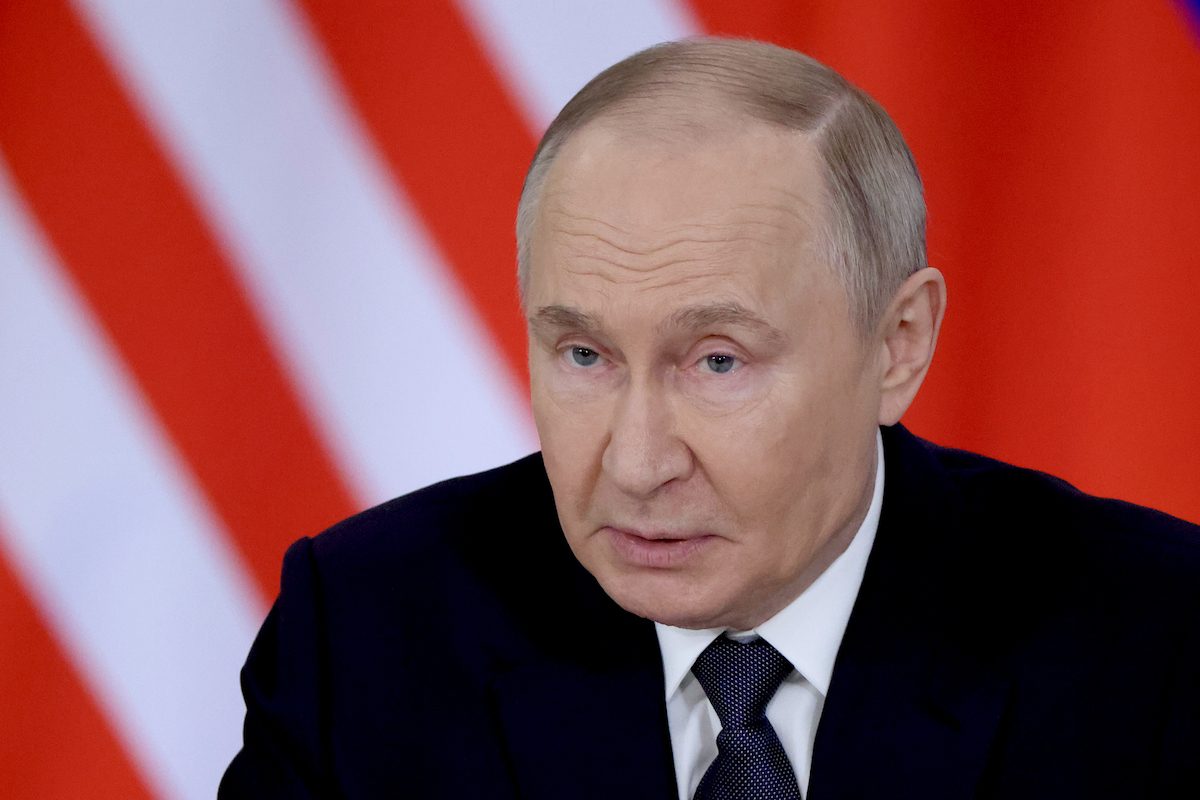As the first reports came in that Yevgeny Prigozhin had been killed, I spoke to Marat Gabidullin, who was a senior commander in Prigozhin’s mercenary army and for a time his personal assistant for military affairs. Gabidiullin is living in exile in France and well known as a bitter critic of Prigozhin — he was forced to change addresses regularly, worried that Prigozhin would send someone to kill him. In the past, he described his old boss as brutal, greedy, smart, dangerous, and willing to sacrifice his men by the thousand for profit and power. But now he’s almost wistful at the thought of Prigozhin’s passing. He told me that one of Russia’s “greats” had been brought down. “It’s the end of an era and the beginning of the time of the small people.”
Putin once said in a television interview, with quiet menace, that he could forgive anything but betrayal
We haven’t seen the body yet but it seems unlikely that Prigozhin will pop up somewhere, wearing one of the absurd wigs and false beards he had on in photographs supposedly found at his St. Petersburg mansion by the Russian security services. So, assuming Prigozhin has met the violent end widely predicted for him after he ordered tanks to roll on Moscow in June, the question now is who gave the order: Vladimir Putin himself, or one of Prigozhin’s many rivals at court? To me, this seemed like a very public execution, something that could only have been ordered by Putin, designed to send a message about what happens to anyone rash enough to challenge him. But Gabidullin isn’t so sure.
He thought this was the work of Sergei Shoigu, the defense minister. He said that Russian power in the world had been damaged as a result of Prigozhin’s killing, especially in Africa. No one could organize there like him. He didn’t think Putin would want this outcome. “This is a personal initiative of Shoigu… This was not Putin’s decision.” Certainly, Prigozhin had fought a public, and increasingly personal, battle with Shoigu, accusing him of deliberately failing to supply Wagner with ammunition in Ukraine. As the bodies of Wagner fighters piled up, Prigozhin gave an interview attacking Shoigu’s family, saying his son-in-law — a critic of the war in Ukraine — should be “raped” or “given the sledgehammer.”
In fact, Prigozhin had a long list of enemies. In the interview he gave about Shoigu, he also attacked Sergei Lavrov, the foreign minister, and other members of “the Moscow elites” for sending their children abroad while ordinary Russians sent theirs to fight. “You sons of bitches, gather up your offspring and send them to war.” I was told by a former MI6 officer, now a private consultant on Russia, that even before the mutiny two months ago, there were many plots to kill Prigozhin by a number of his rivals, acting together or separately.
Perhaps Putin did not need to give the order: everyone knew what had to be done, and probably expected to be rewarded for doing it. A former officer in the FSB — the successor to the KGB — told me this was how things worked in Putin’s court. The boss gave a nod or a hint of what he wanted, and everyone would scramble to do it, knowing they’d get a bigger cut of the action in future.
Prigozhin’s murder seemed inevitable ever since Putin called him a traitor in a nationally televised address (made when it still seemed possible that the mutineers might succeed). There is only one thing to be done with traitors in Putin’s Russia, after all. Putin once said in a television interview, with quiet menace, that he could forgive anything but betrayal. The pardon that Putin was apparently forced to grant Prigozhin made Putin look weak — he looked weaker still with every moment that Prigozhin remained breathing. He even invited Prigozhin and his senior commanders to the Kremlin last month for talks.
But of course, Prigozhin should have known that it’s after you go to kiss the don’s ring — and he pronounces you forgiven — that you can expect the garotte from behind. Over the past eighteen months of the war, many of Putin’s critics have fallen out of windows or died from mysterious — previously undiagnosed — heart conditions. But there was no ambiguity in the apparent means of executing Prigozhin, shooting down his plane with a missile fired from an army missile battery. This was a public, dramatic and unmistakable message sent by Putin to anyone who might challenge him again.
The exiled Russian oligarch Mikhail Khodorkovsky has said that it was an “extrajudicial killing.” He told me earlier this year that he regarded Putin as “a bandit… a gangster” used to “disregarding the law completely.” He believed that Prigozhin’s rise was a logical outcome of the way things were done in Putin’s Russia, and the two men had come up together in St. Petersburg. Khodorkovsky says now: “It is unconscionable to kill someone without a trial… But in the world where Putin operates — that of gangsters — that’s the only way things can be done. After all, who knows what he might have said in court?”
Though Putin could easily have had Prigozhin arrested, it seems that giving him the public platform of a trial was unthinkable. Could Prigozhin have been the only man in Russia to think he’d got away with it — could he have been that naive? At times, he seemed to know that a more brutal end was coming. This was not a man who was ever going to die quietly in his bed. He said as much in an interview reposted now on Grey Zone, a Russian Telegram channel associated with Wagner. “It’s better to die a hero than to live a faggot. Oh, guys, just take me down, that’s all…” In another interviewed posted on Grey Zone, he says, resigned: “We will all get to hell, but in hell we will be the best.”
On Wagner’s Telegram channels, they call those behind Prigozhin’s death “traitors to the Motherland.” There are promises of a second march on the capital. The unanswered question from the original mutiny, in June, was how much support Prigozhin had from elsewhere in the Kremlin; did he expect other units from the security forces to join his coup? To march on Moscow without expecting such help would have been an act of suicidal folly.
The threats of revenge from Wagner loyalists on Telegram are perhaps not to be taken seriously — given the message that Prigozhin’s death is intended to convey to anyone else who raises a hand against Putin. However, the other message that Putin sent, no doubt unwittingly, is that you have to kill the Tsar, not wound him. If you’re going to march on Moscow, don’t stop.
This article was originally published on The Spectator’s UK website.

























